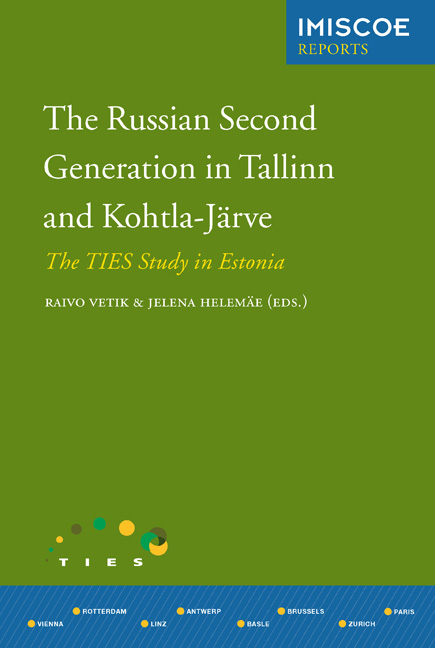Book contents
- Fronmatter
- Contents
- Preface
- List of Tables, Figures and Chapter Appendices
- 1 Introduction
- 2 Migration Patterns
- 3 Integration Policies
- 4 Ethnic Inequalities in Education
- 5 Explaining Different Returns from Human Capital in the labour Market
- 6 Income Inequality
- 7 Housing Conditions Andneighbourhood Satisfaction
- 8 Contact and Crisis in Interethnic Relations
- 9 Gender role Attitudes
- 10 Sense of Belonging to Estonia
- 11 Conclusions
- Appendix
- List of Contributors
- Other IMISCOE Titles
4 - Ethnic Inequalities in Education
Published online by Cambridge University Press: 20 January 2021
- Fronmatter
- Contents
- Preface
- List of Tables, Figures and Chapter Appendices
- 1 Introduction
- 2 Migration Patterns
- 3 Integration Policies
- 4 Ethnic Inequalities in Education
- 5 Explaining Different Returns from Human Capital in the labour Market
- 6 Income Inequality
- 7 Housing Conditions Andneighbourhood Satisfaction
- 8 Contact and Crisis in Interethnic Relations
- 9 Gender role Attitudes
- 10 Sense of Belonging to Estonia
- 11 Conclusions
- Appendix
- List of Contributors
- Other IMISCOE Titles
Summary
Introduction
One of the most basic questions of integration research is whether the life circumstances of immigrants and natives have converged or diverged. Educational attainment is of key importance for the integration of immigrants and their descendants because education substantially shapes immigrants’ labour market outcomes. Ethnic educational inequality is a widespread phenomenon, characterising numerous school systems throughout the world (see Heath & Brinbaum 2007).
The substantial disadvantage of the first generation of immigrants is explained by the lack of fluency in the language of the host country, foreign educational credentials and foreign work experience. The main conclusion has been that their disadvantages in the labour market may not necessarily be indicative of discrimination but rather, may reflect their lack of resources (Heath & Cheung 2007). In most Western European countries, the second generation is less disadvantaged. They have grown up and attained education in the country of destination; they are more fluent in the destination language and have broader social networks (Crul & Vermeulen 2003; Heath & Cheung 2007). That said, while members of the second generation attain better results than those of the first generation, children of immigrants still experience considerable disadvantages.
The educational outcomes of the second generation provide a challenge for explanations of educational inequalities in the western academic literature (see Ogbu 1997; Kao & Thompson 2003; Modood 2004; Portes & Hao 2004; Heath & Brinbaum 2007). The disadvantages of the second generation in education in Western European and other immigrant countries have been explained by different mechanisms. For various countries, it has been found that ethnic disparities in education are largely the result of differences in the educational and social background of parents (Kao & Thompson 2003; Kristen & Granato 2007; Phalet, Deboosere & Bastiaenssen 2007). Lower educational attainment may result, primarily, from class origin rather than from genuine ethnic traits (Kalter, Granato & Kristen 2007). Disadvantaged social class origins and low education in the parents’ generation lead to poorer educational attainment in the second generation (Alba, Handl & Müller 1994; Heath & McMahon 2005; Hout 2005).
- Type
- Chapter
- Information
- The Russian Second Generation in Tallinn and Kohtla-JärveThe TIES Study in Estonia, pp. 59 - 92Publisher: Amsterdam University PressPrint publication year: 2012
- 1
- Cited by



